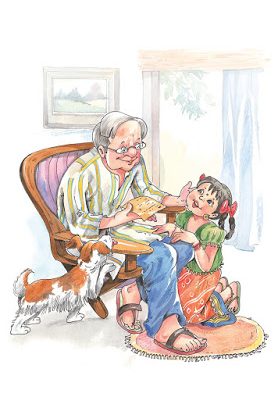A Language Remembered

 |
| Illustration : Henu |
around taatha to hear stories. Stores of Gods, demons, fantastical creatures and times long gone.
Stories from his childhood that became a part of ours. Stories that asked questions and stories that
provided answers. There was a story for everything and not all were stories we wanted to hear. I
remember being particularly upset about one where wasted food goes back to the earth goddess
to sob.
‘bhoochandis’. Words and memories that I haven’t revisited or heard in a long time. Words that
remind me of a magical childhood and a world that I hope to share with my toddler in some way. As
parents we spend a lot of time trying to create a ‘magical’ childhood for our children. The magic,
however, is in doing nothing, it is in listening and sharing. It is in keeping things simple. When was
the last time we spent an entire afternoon just sitting around and sharing stories with our children
with no planned ‘activity’?
While it is essential to be able to communicate in your mother language, it is in the telling of stories
that you discover the poetry and rich imagery inherent in the language. Remembering a story in my
grandfathers voice with it’s vast and descriptive vocabulary brings back memories of playing dress
up in my grandmothers nine yard silk sarees and cuddling up with Amma (and more stories) for
bedtime. A magician and a ‘mandiravadhi’, though technically the same, are not quite the same.
They practice different styles of magic, as a five year old me was very convinced. One lived in the
world of Arthurian Legends and the other in a little thicket on the banks of the Cauvery. A fair lot is
definitely lost in translation.
I had no idea that I was inheriting my grandfathers love for language and literature while I sat on
his lap listening to him. On the contrary, i thought i hated the language. I presumed that reading my
Enid Blyton’s and wanting to eat a scone for tea were the beginnings of my creative process. All
those hours I sat in Tamil class at school, listening to a particularly brilliant teacher and struggling
with the grammar of the language, thinking I cannot wait to be done with having to study the
language, what I was doing was to begin to fall in love with the language without quite realising it. It
took me many decades to understand that the beginnings of my creative process indeed lay in
those stories and Tamil classes.
practice. Every time I read a stunning piece of poetry or an evocative line of prose, it inspires and
touches my choreographic process. I think that my ability to access the imaginative scope of my
mother language has been the beginning of my own artistic practice. For, language brings with it
memories, context, cultural references and history.








